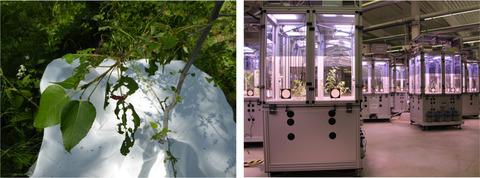Our official English website, www.x-mol.net, welcomes your feedback! (Note: you will need to create a separate account there.)
Invasive earthworms reduce chemical defense and increase herbivory and pathogen infection in native trees
Journal of Ecology ( IF 5.5 ) Pub Date : 2020-09-14 , DOI: 10.1111/1365-2745.13504 Madhav P. Thakur 1, 2, 3, 4 , Tom Künne 1 , Sybille B. Unsicker 5 , Arjen Biere 3 , Olga Ferlian 1, 2 , Ulrich Pruschitzki 1, 2 , Lise Thouvenot 1, 2 , Manfred Türke 1, 2 , Nico Eisenhauer 1, 2
中文翻译:

入侵性reduce降低了化学防御能力,并增加了本地树木的食草和病原体感染
更新日期:2020-09-14
Journal of Ecology ( IF 5.5 ) Pub Date : 2020-09-14 , DOI: 10.1111/1365-2745.13504 Madhav P. Thakur 1, 2, 3, 4 , Tom Künne 1 , Sybille B. Unsicker 5 , Arjen Biere 3 , Olga Ferlian 1, 2 , Ulrich Pruschitzki 1, 2 , Lise Thouvenot 1, 2 , Manfred Türke 1, 2 , Nico Eisenhauer 1, 2
Affiliation

|
- Recent research shows that earthworms can alter defense traits of plants against herbivores and pathogens by affecting soil biochemistry. Yet, the effects of invasive earthworms on defense traits of native plants from previously earthworm‐free ecosystems as well as the consequences for multitrophic interactions are virtually unknown.
- Here we use a combination of an observational study and a complementary experimental study to investigate the effects of invasive earthworms on leaf defense traits, herbivore damage and pathogen infection in two poplar tree species (Populus balsamifera and Populus tremuloides) native to North American boreal forests.
- Our observational study showed that earthworm invasion was associated with enhanced leaf herbivory (by leaf‐chewing insects) in saplings of both tree species. However, we only detected significant shifts in the concentration of chemical defense compounds in response to earthworm invasion for P. balsamifera. Specifically, leaf phenolic concentrations, including salicinoids and catechin, were lower in P. balsamifera from earthworm‐invaded sites.
- Our experimental study confirmed an earthworm‐induced reduction in leaf defense levels in P. balsamifera for one of the defense compounds, tremulacin. The experimental study additionally showed that invasive earthworms reduced leaf dry matter content, potentially increasing leaf palatability, and enhanced susceptibility of trees to infection by a fungal pathogen, but not to aphid infestation, in the same tree species.
- Synthesis. Our results show that invasive earthworms can decrease the concentrations of some chemical defense compounds in P. balsamifera, which could make them susceptible to leaf‐chewing insects. Such potential impacts of invasive earthworms are likely to have implications for tree survival and competition, native tree biodiversity and ecosystem functioning.
中文翻译:

入侵性reduce降低了化学防御能力,并增加了本地树木的食草和病原体感染
- 最近的研究表明,can可以通过影响土壤生物化学来改变植物对草食动物和病原体的防御性状。但是,入侵unknown对以前没有earth的生态系统中本地植物防御性状的影响以及多营养相互作用的后果几乎是未知的。
- 在这里,我们结合了观察性研究和补充性实验研究,以研究侵入性on对北美北方森林原生的两种杨树树种(Balulus balsamifera和Trepuroide)的叶片防御性状,草食动物危害和病原体感染的影响。
- 我们的观察研究表明,worm入侵与两种树苗的叶片中的草食性增强(由咀嚼昆虫引起)有关。但是,我们仅检测到针对defense杆状疟原虫入侵的化学防御化合物浓度的显着变化。具体而言,来自earth侵袭部位的香脂假单胞菌中的叶片酚类浓度(包括水杨素和儿茶素)较低。
- 我们的实验研究证实叶防守水平蚯蚓诱导减少P.香脂的防御化合物中的一种,tremulacin。实验研究还表明,在同一树种中,侵入性reduced降低了叶片干物质含量,潜在地增加了叶片适口性,并增强了树木对真菌病原体感染而不是蚜虫侵染的敏感性。
- 综合。我们的研究结果表明,侵入性can可以降低杆状疟原虫中某些化学防御化合物的浓度,从而使它们容易受到咀嚼昆虫的侵害。入侵性的这种潜在影响可能会对树木的生存和竞争,本地树木的生物多样性和生态系统功能产生影响。



























 京公网安备 11010802027423号
京公网安备 11010802027423号